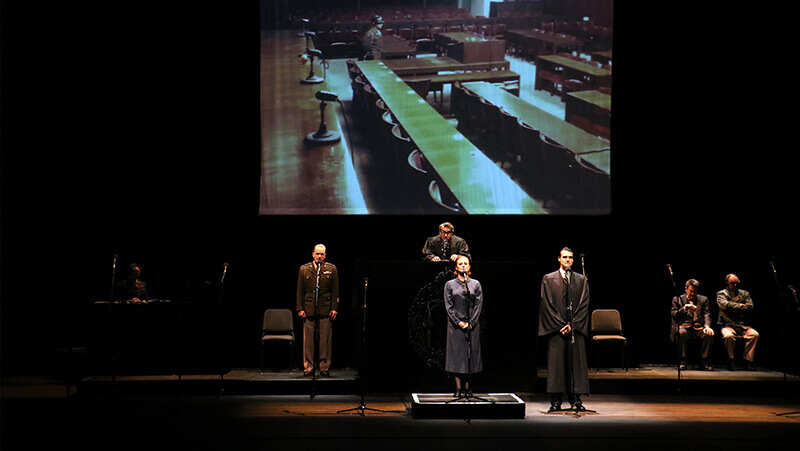September 23, 2019
Purdue Convocations researches live theater as method of teaching
 Students in History 104 at Purdue University watched the play, “Judgment at Nuremburg” as part of a study on whether live theater could be used as an educational tactic. (Purdue University photo)
Download image
Students in History 104 at Purdue University watched the play, “Judgment at Nuremburg” as part of a study on whether live theater could be used as an educational tactic. (Purdue University photo)
Download image
WEST LAFAYETTE, Ind. — Could live theater performances be an effective educational tactic in enhancing student learning and retention of information?
Research conducted by Purdue Convocations staff indicates that it could, in fact, boost students’ comprehension and analysis abilities. The research was centered on the radio theater-style performance of “Judgment at Nuremberg.” To conduct the study, the Purdue Convocations education team collected surveys from a section of Purdue’s History 104 course.
The survey questioned students’ previous knowledge of the Nuremberg trials; their expectations of the play compared with their viewing experience; how the live performance compared with other modes of learning; the type of information the students gained; the emotions within and physical proximity to the show; and the students’ concentration, memory, empathy and critical thinking skills.
The study concluded that exposure to theater helped the students understand and critically analyze the historical Nuremberg trials. Over 81% of the students believed the live performance helped them retain information about the Nuremberg trials more effectively than film or a textbook, and 87.5% reported feeling an emotional connection with the actors. More than 56% of the students agreed that live theater is a much more personal experience and gave them a person to empathize with rather than reading a name in a textbook.
The research was overseen by Amanda Mayes, manager of education in Purdue Convocations. Research on the theatrical “Judgment at Nuremberg” presentation illustrates that live theater should be explored further as a potential teaching method.
“Ultimately, my work is about definitely proving that the arts matter,” Mayes said. “It is my goal to add to the body of literature understanding how the arts impact us. We plan to continue exploring how theater can be used as a learning tool. Our next study examines the use of a live performance to improve reading skills. In the future, I would like to work with scientists in the neurohumanities to understand the neurological changes that happen when we are immersed in a play or concert.”
Results on the study were presented as part of the 2019 Symposium on Education in Entertainment and Engineering, which occurred in late July at Purdue. This was the first year of the symposium. More information on the symposium can be found online.
Writer: Madison Sanneman, msannema@purdue.edu
Source: Amanda Mayes, asmayes@purdue.edu

